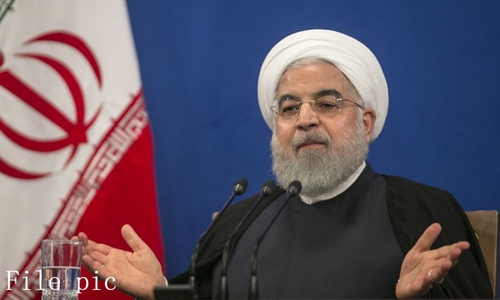Syria, Iran slam US for upholding economic sanctions despite virus
Source:AFP Published: 2020/4/21 19:13:40

Iranian President Hassan Rouhani speaks at a press conference in Tehran, Iran, on Oct. 14, 2019. (Xinhua/Ahmad Halabisaz)
Syrian President Bashar al-Assad and Iran's Foreign Minister Mohammad Javad Zarif on Monday slammed their common foe the US for maintaining sanctions amid the coronavirus pandemic.
On his first official meeting with Zarif in a year, Assad expressed condolences to Iran, the regional epicenter of the coronavirus pandemic with 5,297 deaths from COVID-19.
A photo released by Assad's office showed him and Zarif sitting opposite from each other, both in face masks. Zarif also wore light blue plastic gloves.
The Islamic republic says it has recorded 84,802 coronavirus infections, while Syria has declared 39 cases, including three deaths.
Assad criticized the US for keeping economic sanctions in place on countries like Syria and Iran "despite these exceptional humanitarian conditions," the Syrian presidency said.
"The coronavirus crisis has exposed the failure of western regimes... and their lack of morals," it added.
Zarif said that "the US real agenda in not lifting its cruel sanctions on countries fighting this disease has now become clear."
During the meeting, Assad also condemned "ongoing encroachments by Turkey on the sovereignty and territory of Syria," in the country's north where Ankara has deployed troops, set up military posts and backed rebels battling the government.
Earlier on Monday, Zarif met with his Syrian counterpart Walid Muallem, the foreign ministry in Damascus said.
They stressed "the importance of continued coordination and the exchange of information and expertise between... the two countries to enhance their ability to confront" the pandemic and "secure the necessary needs and requirements for prevention, diagnosis and treatment."
Iran, along with Russia, is one of the Syrian government's main allies in a nine-year civil war that has killed more than 380,000 people and forced more than half of the country's pre-war population from their homes.
AFP
Posted in: MID-EAST